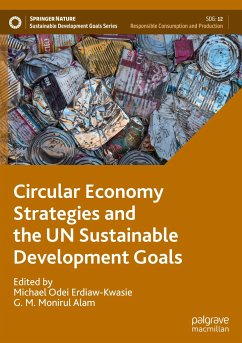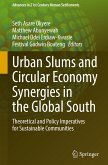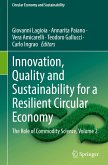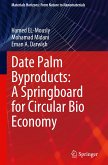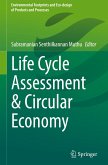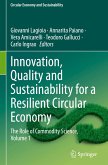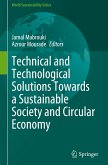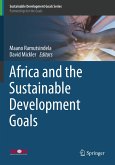Circular Economy Strategies and the UN Sustainable Development Goals
Herausgegeben:Erdiaw-Kwasie, Michael Odei; Alam, G. M. Monirul
Circular Economy Strategies and the UN Sustainable Development Goals
Herausgegeben:Erdiaw-Kwasie, Michael Odei; Alam, G. M. Monirul
- Gebundenes Buch
- Merkliste
- Auf die Merkliste
- Bewerten Bewerten
- Teilen
- Produkt teilen
- Produkterinnerung
- Produkterinnerung
This book provides novel perspectives to the ongoing global discussions on the UN Sustainable Development Goals (SDGs). Current knowledge on circular economy and the SDGs target in developing and emerging countries are mostly fragmented and empirical evidence is limited. The approach taken in the book is unique as it presents holistic viewpoints about the synergies, opportunities and challenges between circular economy and SDGs targets in developing and emerging countries. The book presents diverse contents on the topic including literature reviews, conceptual discussions, case studies, and empirical analysis.…mehr
Andere Kunden interessierten sich auch für
![Urban Slums and Circular Economy Synergies in the Global South Urban Slums and Circular Economy Synergies in the Global South]() Urban Slums and Circular Economy Synergies in the Global South108,99 €
Urban Slums and Circular Economy Synergies in the Global South108,99 €![Innovation, Quality and Sustainability for a Resilient Circular Economy Innovation, Quality and Sustainability for a Resilient Circular Economy]() Innovation, Quality and Sustainability for a Resilient Circular Economy154,99 €
Innovation, Quality and Sustainability for a Resilient Circular Economy154,99 €![Date Palm Byproducts: A Springboard for Circular Bio Economy Date Palm Byproducts: A Springboard for Circular Bio Economy]() Hamed El-MouslyDate Palm Byproducts: A Springboard for Circular Bio Economy116,99 €
Hamed El-MouslyDate Palm Byproducts: A Springboard for Circular Bio Economy116,99 €![Life Cycle Assessment & Circular Economy Life Cycle Assessment & Circular Economy]() Life Cycle Assessment & Circular Economy100,99 €
Life Cycle Assessment & Circular Economy100,99 €![Innovation, Quality and Sustainability for a Resilient Circular Economy Innovation, Quality and Sustainability for a Resilient Circular Economy]() Innovation, Quality and Sustainability for a Resilient Circular Economy226,99 €
Innovation, Quality and Sustainability for a Resilient Circular Economy226,99 €![Technical and Technological Solutions Towards a Sustainable Society and Circular Economy Technical and Technological Solutions Towards a Sustainable Society and Circular Economy]() Technical and Technological Solutions Towards a Sustainable Society and Circular Economy161,99 €
Technical and Technological Solutions Towards a Sustainable Society and Circular Economy161,99 €![Africa and the Sustainable Development Goals Africa and the Sustainable Development Goals]() Africa and the Sustainable Development Goals93,99 €
Africa and the Sustainable Development Goals93,99 €-
-
-
This book provides novel perspectives to the ongoing global discussions on the UN Sustainable Development Goals (SDGs). Current knowledge on circular economy and the SDGs target in developing and emerging countries are mostly fragmented and empirical evidence is limited. The approach taken in the book is unique as it presents holistic viewpoints about the synergies, opportunities and challenges between circular economy and SDGs targets in developing and emerging countries. The book presents diverse contents on the topic including literature reviews, conceptual discussions, case studies, and empirical analysis.
Hinweis: Dieser Artikel kann nur an eine deutsche Lieferadresse ausgeliefert werden.
Hinweis: Dieser Artikel kann nur an eine deutsche Lieferadresse ausgeliefert werden.
Produktdetails
- Produktdetails
- Sustainable Development Goals Series
- Verlag: Palgrave Macmillan / Springer Nature Singapore / Springer, Berlin
- Artikelnr. des Verlages: 978-981-99-3082-1
- 2023
- Seitenzahl: 720
- Erscheinungstermin: 22. August 2023
- Englisch
- Abmessung: 216mm x 153mm x 41mm
- Gewicht: 1139g
- ISBN-13: 9789819930821
- ISBN-10: 9819930820
- Artikelnr.: 67803671
- Herstellerkennzeichnung Die Herstellerinformationen sind derzeit nicht verfügbar.
- Sustainable Development Goals Series
- Verlag: Palgrave Macmillan / Springer Nature Singapore / Springer, Berlin
- Artikelnr. des Verlages: 978-981-99-3082-1
- 2023
- Seitenzahl: 720
- Erscheinungstermin: 22. August 2023
- Englisch
- Abmessung: 216mm x 153mm x 41mm
- Gewicht: 1139g
- ISBN-13: 9789819930821
- ISBN-10: 9819930820
- Artikelnr.: 67803671
- Herstellerkennzeichnung Die Herstellerinformationen sind derzeit nicht verfügbar.
Dr Michael Odei Erdiaw-Kwasie is an award-winning author and Lecturer in the Business and Accounting Discipline at Charles Darwin University. Dr Erdiaw-Kwasie holds a PhD in Sustainability Management from the University of Southern Queensland. His research interests focus on sustainability transitions, circular economy, climate risks & business, digital futures, and global development. Dr G. M. Monirul Alam is currently a Professor at the Department of Agribusiness, Bangabandhu Sheikh Mujibur Rahman Agricultural University (BSMRAU), Bangladesh. He also holds the position of Adjunct Research Fellow at USQ, Australia. He is an award-winning researcher whose current research domains are climate change adaptation, poverty, food security, ICT, circular economy, and impact analysis.
Section 1: Literature review of circular strategies.- Chapter 1 Circularity challenges in SDGs Implementation: A review in context.- Chapter 2 Sharing instead of Owning: A Synthesized Review on Collaborative Consumption in Sub-Saharan Africa.- Section 2: Conceptual insights on circular economy.- Chapter 3 Contextualizing circular economy research-to-practice transition.- Chapter 4 STEAM education and innovation learning towards circular strategies.- Chapter 5 How can Ghana Transition from a Linear to a circular economy of waste management? A conceptual analysis of policy approaches.- Section 3: Country-level case studies on circular strategies.- Chapter 6 Linear economy wolf in circular economy sheep clothing: Ride-hailing in Ghana.- Chapter 7 A transition towards a circular food economy in Ghana: An institutional and policy analysis.- Chapter 8 Macroeconomic performance and progress towards a circular economy in developing countries.- Chapter 9 Circularity in Mauritius: Examining the determinants.- Chapter 10 Circular economy principles and responsible manufacturing: Assessing Implications for resource conservation, emission reduction, cost performance, and environmental legitimacy.- Chapter 11 Human capital transformation for circular economy and sustainable development: A government-linked company experience.- Chapter 12 Applying circular economy thinking to food systems in the hospitality industry in Nigeria.- Chapter 13 Circular economy in Turkish manufacturing sector: The roles of green manufacturing and innovation.- Chapter 14 Corporate sustainability and circular economy in Turkish service and manufacturing business.- Chapter 15 Circular Value Chains: Circular Strategies and Managerial Perceptions of Supply Chain Professionals from Turkey.- Chapter 16 Exploring factors affecting the adoption of green process management model in the software industry: Progress towards sustainability and circularity.- Chapter 17 Capital Maintenance and Depreciation Accounting Convergence: A New Model for Sustainability and Circularity in Capital Maintenance.- Chapter 18 Pathways toward a circular economy in Ghana: The contribution of waste transfer stations and the informal waste collectors in solid waste management.- Chapter 19 Institutionalisation and Enforcement of Circular Fisheries Practices in Uganda: The role of the Military in the Implementation of the National Fisheries Policy.- Chapter 20 Gayo's sustainable community waste management model: Impacts and lessons for circular futures.
Section 1: Literature review of circular strategies.- Chapter 1 Circularity challenges in SDGs Implementation: A review in context.- Chapter 2 Sharing instead of Owning: A Synthesized Review on Collaborative Consumption in Sub-Saharan Africa.- Section 2: Conceptual insights on circular economy.- Chapter 3 Contextualizing circular economy research-to-practice transition.- Chapter 4 STEAM education and innovation learning towards circular strategies.- Chapter 5 How can Ghana Transition from a Linear to a circular economy of waste management? A conceptual analysis of policy approaches.- Section 3: Country-level case studies on circular strategies.- Chapter 6 Linear economy wolf in circular economy sheep clothing: Ride-hailing in Ghana.- Chapter 7 A transition towards a circular food economy in Ghana: An institutional and policy analysis.- Chapter 8 Macroeconomic performance and progress towards a circular economy in developing countries.- Chapter 9 Circularity in Mauritius: Examining the determinants.- Chapter 10 Circular economy principles and responsible manufacturing: Assessing Implications for resource conservation, emission reduction, cost performance, and environmental legitimacy.- Chapter 11 Human capital transformation for circular economy and sustainable development: A government-linked company experience.- Chapter 12 Applying circular economy thinking to food systems in the hospitality industry in Nigeria.- Chapter 13 Circular economy in Turkish manufacturing sector: The roles of green manufacturing and innovation.- Chapter 14 Corporate sustainability and circular economy in Turkish service and manufacturing business.- Chapter 15 Circular Value Chains: Circular Strategies and Managerial Perceptions of Supply Chain Professionals from Turkey.- Chapter 16 Exploring factors affecting the adoption of green process management model in the software industry: Progress towards sustainability and circularity.- Chapter 17 Capital Maintenance and Depreciation Accounting Convergence: A New Model for Sustainability and Circularity in Capital Maintenance.- Chapter 18 Pathways toward a circular economy in Ghana: The contribution of waste transfer stations and the informal waste collectors in solid waste management.- Chapter 19 Institutionalisation and Enforcement of Circular Fisheries Practices in Uganda: The role of the Military in the Implementation of the National Fisheries Policy.- Chapter 20 Gayo's sustainable community waste management model: Impacts and lessons for circular futures.

